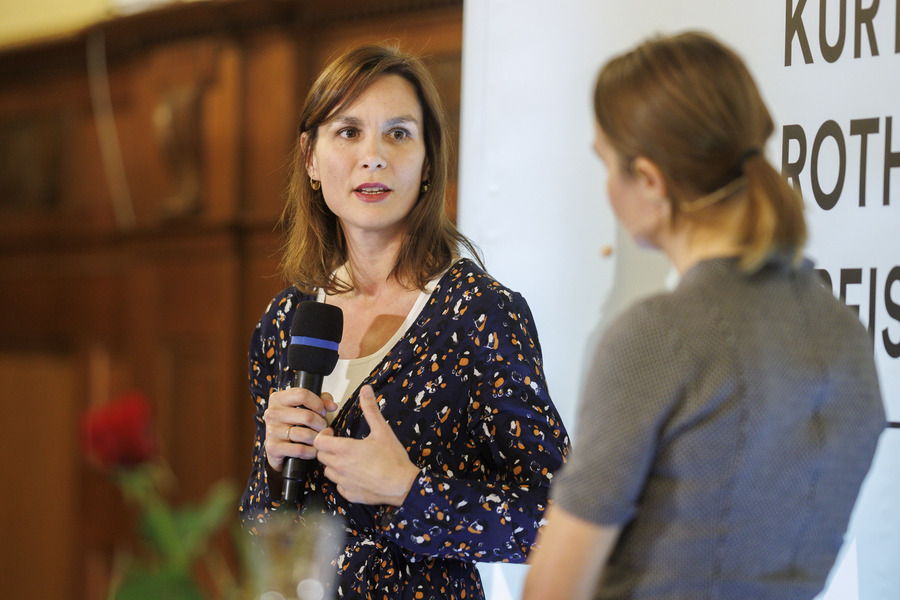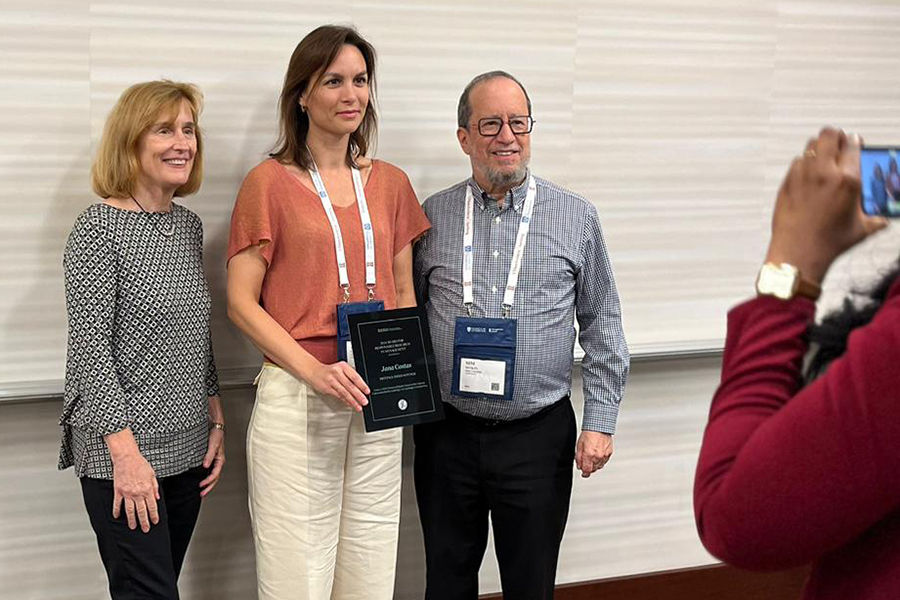"Notebooks and pens are foreign objects in the everyday lives of cleaning staff" - Prof Dr Jana Costas honoured again for study about cleaning staff
On 21 October 2024, the Karl Renner Institute in Vienna awarded the Kurt Rothschild Prize to Viadrina economist Prof. Dr Jana Costas for her book "Im Minus-Bereich: Reinigungskräfte und ihr Kampf um Würde", which received a lot of media attention. The English version of the study entitled "Dramas of Dignity: Cleaners in the Corporate Underworld of Berlin" had already been honoured with the "Responsible Research in Management" award by the Academy of Management in August 2024. In July 2023, Jana Costas received the book prize from the European Group for Organisation Studies (EGOS). In this interview, the researcher talks about her methodological approach to the "underworld" of cleaning staff, the challenges she has faced and the research questions she is now pursuing.
Mrs Costas, what was your interest in the working world of cleaners?
Cleaners provide a service that is indispensable for society and the economy. However, this precarious work is stigmatised and made invisible. My research interest was to better understand how inequality arises within interaction in the everyday working life of cleaners and how this is experienced from the perspective of those at the bottom of the labour market hierarchy: What does it mean to work as a cleaner? How do they perceive their role? And how do they perceive those for whom they provide this service?

Prof. Dr Jana Costas at the award ceremony for the Kurt Rothschild Prize on 21 October 2024
How did you proceed methodically?
I organised ethnographic research and immersed myself in the working world of cleaning staff. I spent almost a year at one of Germany's largest cleaning companies, where I took part in internal workshops with customer advisors and supervisors and also attended the Christmas party. For six months, I supported cleaning staff at the Potsdamer Platz in their various shifts: from exterior to interior cleaning of offices, flats and a shopping centre. Right from the start, I openly told everyone in the company that I work for a university and was researching the topic of work in building cleaning.
What were the challenges involved? What are the advantages and disadvantages of such a method?
An ethnographic approach enables us to understand how the cleaners experience their working day, how they interact with each other and how others interact with them. It also gave me access to the "minus area" of the Potsdamer Platz: this underworld of up to four levels from which service staff maintain the upper city. The challenge of the method lies in the dual role: on the one hand, working, getting up early, doing physically strenuous work, worrying about possible customer complaints in the event of mistakes and, on the other hand, conducting research, i.e. building up trust with the various cleaning staff, taking brief notes in between and making detailed field notes at home after the working day. Ethical questions also arise, such as: How do I protect informants and how do I behave in the event of disputes in the field?

Prof. Dr Jana Costas in August 2024 at the presentation of the "Responsible Research in Management" award by the Academy of Management in Chicago
How did you work specifically?
At the beginning of my study, I had actually planned to take a small notebook with me. However, I quickly realised that notebooks and pens are completely foreign objects in the everyday lives of cleaners. I even had the impression that they only had negative associations with documents, as if they were something official that could be used against them in case of doubt. Instead, I typed bullet points into my smartphone between shifts or during breaks.
What were the reactions of the cleaning staff?
To my surprise, the cleaners were much more receptive to my presence than I had expected. On my very first day in the field, one cleaner - some called her "mum" - reacted to my introduction during the breakfast break with the following words: "At last someone is looking at what we do here instead of taking it for granted." Of course, there were also some cleaners who remained sceptical towards me, but overall my interest was perceived as appreciative and welcomed.
What are the key findings that you describe in your book?
Cleaners turn to their work for dignity: They take pride in going to work, taking shifts on their own, and they celebrate a strong work ethic. Some are fond of cleaning up bad messes, sometimes bragging about it. In interactions with others, however, they receive little recognition precisely because of their work: customers or "the upper world" complain or treat them like non-persons. They are not only made invisible spatially and temporally by the "minus area" and the marginal times of their work, but also socially: even when they are present, they are ignored. Surveillance by superiors suggests mistrust towards them. The cleaners are constantly differentiating themselves internally and thus denying each other their status. All of this is the starting point of an ongoing struggle for dignity.
Are you continuing your research and will there be follow-up projects?
I am still working on the topics of work, organisation and inequality, even if I don't have a direct follow-up project. At the moment, I'm working with media scientist Professor Patrick Vonderau from the Martin Luther University Halle-Wittenberg on a research project funded by the Federal Commissioner for Culture and Media on the topic of remuneration for music creators in the German music streaming market, as well as on a research project on the lobbying practices of tech companies.
(Jana Costas war interviewed in summer 2023 after receiving the EGOS Book Prize.)
For publication in German and English:
Costas, J. (2022). Dramas of Dignity: Cleaners in the Corporate Underworld of Berlin. Cambridge: Cambridge University Press. Winner of the European Group for Organisation Studies Book Award 2023.
Translated by Deepl and edited
Back to the news portal
Share article: